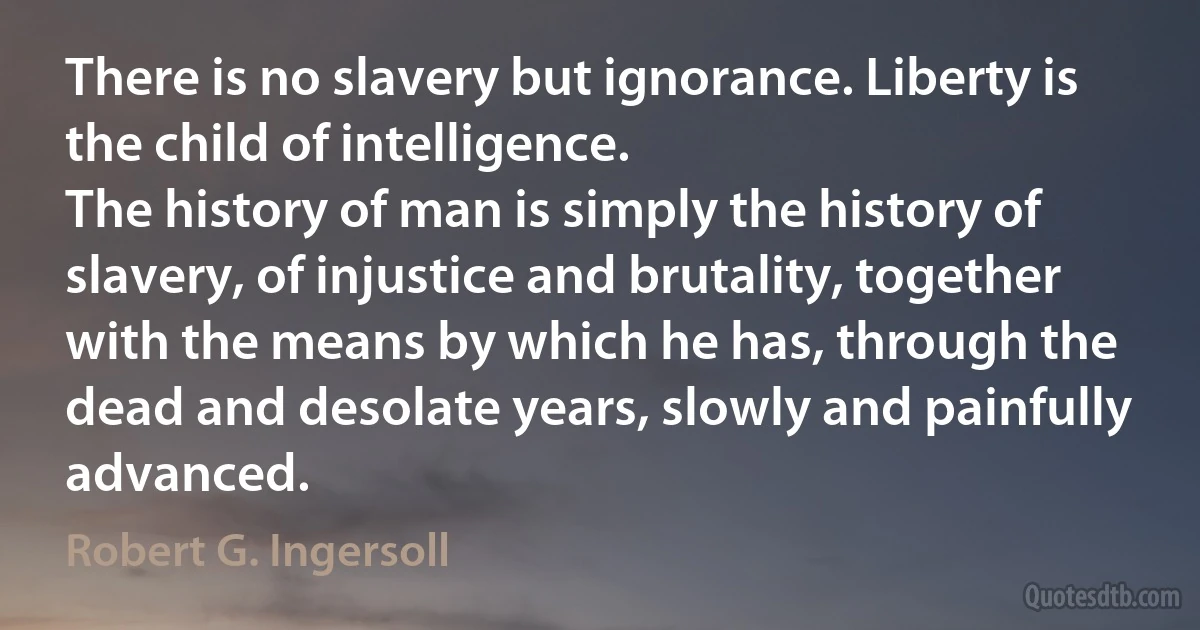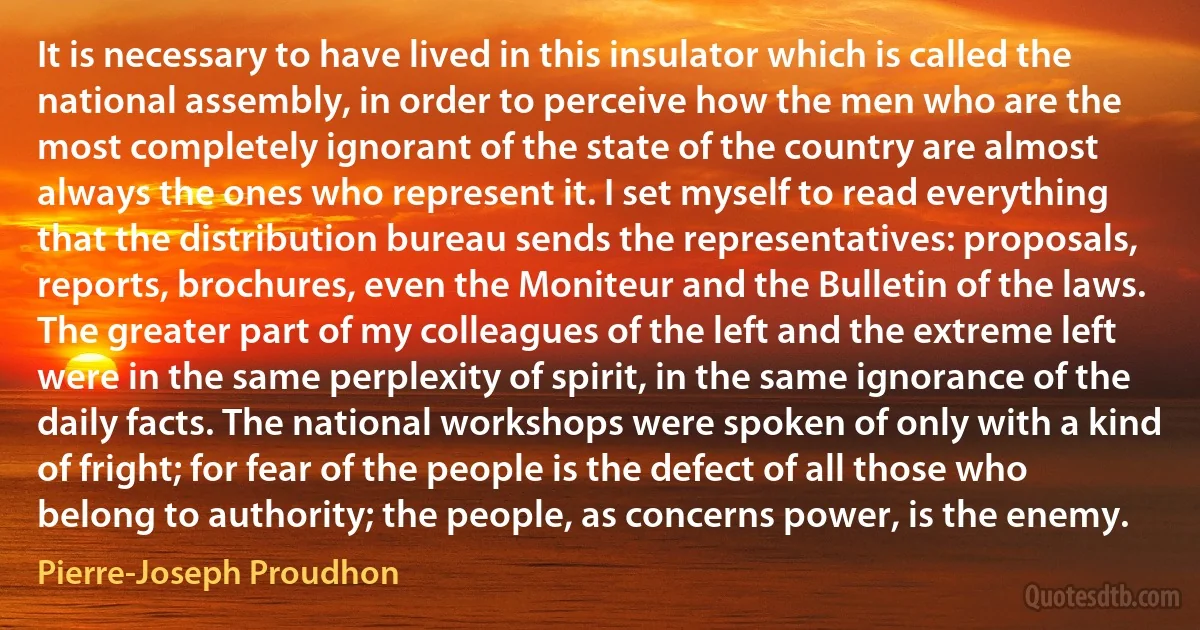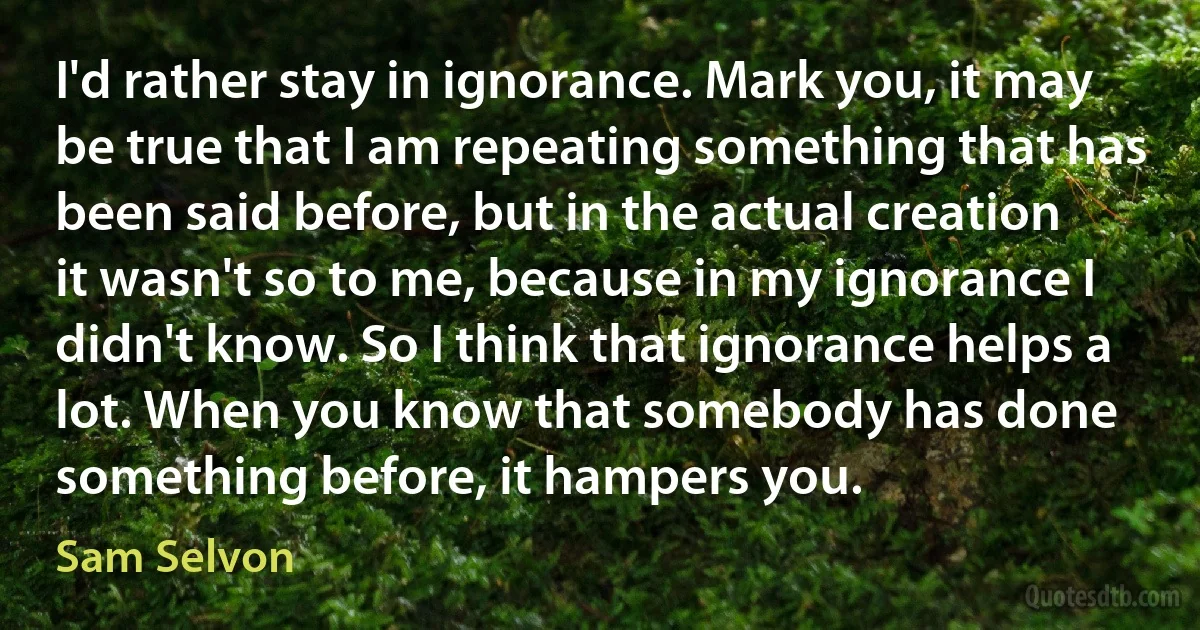Ignorance Quotes - page 66
I have existed from all eternity and, behold, I am here; and I shall exist till the end of time, for my being has no end.
I soared into limitless space and took wing in the imaginal world, approaching the circle of exalted light; and here I am now, mired in matter.
I listened to the teachings of Confucius, imbibed the wisdom of Brahma, and sat beside Buddha beneath the tree of insight. And now I am here, wrestling with ignorance and unbelief. I was on Sinai when Yahweh shed his effulgence on Moses; at the River Jordan I witnessed the miracles of the Nazarene; and in Medina I heard the words of the Messenger to the Arabs. And here I am now, a captive of confusion.

Kahlil Gibran
We hide this universality if we can, but it appears at all points. We are as ungrateful as children. There is nothing we cherish and strive to draw to us but in some hour we turn and rend it. We keep a running fire of sarcasm at ignorance and the life of the senses; then goes by, perchance, a fair girl, a piece of life, gay and happy, and making the commonest offices beautiful by the energy and heart with which she does them; and seeing this we admire and love her and them, and say, "Lo! a genuine creature of the fair earth, not dissipated or too early ripened by books, philosophy, religion, society, or care!" insinuating a treachery and contempt for all we had so long loved and wrought in ourselves and others.

Ralph Waldo Emerson
Some men have become so sick that they try to push themselves in a sexual way into a baby, splitting them. Fathers are sexually abusing their daughters, along with uncles, brothers, cousins and even aunts; and now the lesbian craze is in. We are so undervalued because of our ignorance and lack of the potential for honor and respect.

Louis Farrakhan
ExxonMobil, the world's largest and most powerful oil company, knew everything there was to know about climate change by the mid-1980s, and then spent the next few decades systematically funding climate denial and lying about the state of the science....
But though we know now that behind the scenes Exxon understood precisely what was going on, in public they feigned ignorance or worse....
Thanks to Exxon's willingness to sucker the world, that world is now a chaotic mess.

Bill McKibben
Is science really gaining in its assault on the totality of the unsolved? As science learns one answer, it is characteristically true that it also learns several new questions. It is as though science were working in a great forest of ignorance, making an ever larger circular clearing within which, not to insist on the pun, things are clear... But as that circle becomes larger and larger, the circumference of contact with ignorance also gets longer and longer. Science learns more and more. But there is an ultimate sense in which it does not gain; for the volume of the appreciated but not understood keeps getting larger. We keep, in science, getting a more and more sophisticated view of our essential ignorance.

Warren Weaver
War is becoming an anachronism; if we have battled in every part of the continent it was because two opposing social orders were facing each other, the one which dates from 1789, and the old regime. They could not exist together; the younger devoured the other. I know very well, that, in the final reckoning, it was war that overthrew me, me the representative of the French Revolution, and the instrument of its principles. But no matter! The battle was lost for civilization, and civilization will inevitably take its revenge. There are two systems, the past and the future. The present is only a painful transition. Which must triumph? The future, will it not? Yes indeed, the future! That is, intelligence, industry, and peace. The past was brute force, privilege, and ignorance. Each of our victories was a triumph for the ideas of the Revolution. Victories will be won, one of these days, without cannon, and without bayonets.

Napoleon Bonaparte
Besotted Being! You think yourself the perfection of existence, while you are in reality the most imperfect and imbecile. You profess to see, whereas you can see nothing but a Point! You plume yourself on inferring the existence of a Straight Line; but I CAN SEE Straight Lines, and infer the existence of Angles, Triangles, Squares, Pentagons, Hexagons, and even Circles. Why waste more words? Suffice it that I am the completion of your incomplete self. You are a Line, but I am a Line of Lines, called in my country a Square: and even I, infinitely superior though I am to you, am of little account among the great nobles of Flatland, whence I have come to visit you, in the hope of enlightening your ignorance.

Edwin Abbott Abbott
[Nelson Algren] broke new ground by depicting persons said to be dehumanized by poverty and ignorance and injustice as being genuinely dehumanized, and dehumanized quite permanently. [...] Reporting on what he saw of dehumanized Americans with his own eyes day after day, year after year, Algren said in effect, ‘Hey – an awful lot of these people your hearts are bleeding for are really mean and stupid. That's just a fact. Did you know that?'

Nelson Algren
The level of historical ignorance and/or jingostic American exceptionalism necessary to believe this is impossible to describe. Compared to what the CIA has done to dozens of other countries since the end of World War II, and what it continues to do, watching Americans cast Russian interference in the 2016 election through online bots and email hacking (even if one believes every claim made about it) as some sort of unique and unprecedented crime against democracy is staggering. Set against what the CIA has done and continues to do to "interfere” in the domestic affairs of other countries - including Russia - the 2016 election was, at most, par for the course for international affairs and, more accurately, a trivial and ordinary act in the context of CIA interference.

Glenn Greenwald
I observe with pleasure, what Mr. Herd has remarked upon the confusion made by Pinkerton of the two Pennecuiks. He has, with equal ignorance, confounded the two Hamiltons (of Bangour and Gilbertfield). But, indeed, his blunders are venial when compared with the more criminal parts of his literary and moral character.

Joseph Ritson
You must either, Mr. Warton, deal in very strange histories, or else you are very unmindful of what you read, or careless of what you say. And, indeed, I cannot but think, if that good and wholesome discipline, which the name of MILTON may probably call to your remembrance, were still in use at Trinity College, the more than childish ignorance of a certain near friend of yours would hardly escape without experiencing its salutary effects.

Joseph Ritson
The Magdalene,
Childlike in ignorance, her thought athirst
For that diviner knowledge which the priests
Had never taught in her far-distant home,
Stood earnest listening to the words that fell
From the firm lips of Jesus. Day by day
They sank upon her heart like blessed rain,
Calling the secret powers that lay within
Deep buried, forth to beauty and to life.

Mary Magdalene
Once in his early youth a man allowed himself to be so far carried away in an overwrought irresponsible state as to visit a prostitute. It is all forgotten. Now he wants to get married. Then anxiety stirs. He is tortured day and night with the thought that he might possibly be a father, that somewhere in the world there could be a created being who owed his life to him. He cannot share his secret with anyone; he does not even have any reliable knowledge of the fact. –For this reason the incident must have involved a prostitute and taken place in the wantonness of youth; had it been a little infatuated or an actual seduction, it would be hard to imagine that he could know nothing about it, but now this this very ignorance is the basis of his agitated torment. On the other hand, precisely because of the rashness of the whole affair, his misgivings do not really start until he actually falls in love.

Søren Kierkegaard
[W]hat Mrs Thatcher seems to have sensed-is that that part of the liberal intelligentsia which grew up in the shadow of Hitler, Spain and Unemployment is deeply alienated from the Labour party. It has never liked trades unions even though, in the form of the 'ragged-trouser generation' (as Mr Stuart Hampshire calls it), it was willing, when young, to profess sympathy for the working classes whom it idolized in ignorance and at a distance and, quite wrongly, regarded as its natural ally in the fight against illiberal, reactionary, capitalistic Conservatism.

Maurice Cowling
When I first started writing, it was much more important for me to appeal to academic audiences or an imagined high-art literary audience. The older I get, the more important it is for me to communicate with everyone and anyone. Right now to me, America is in a crisis of constant misunderstandings. Some of it is willful ignorance, but some of it is not willful and it requires people to explain things...

Porochista Khakpour
Poetry is not; or seems not to be. But it appears that among the great conflicts of this culture, the conflict in our attitude toward poetry stands clearly lit. There are no guards built up to hide it. We call see its expression, and we can see its effects upon us. We can see our own conflict and our own resource if we look, now, at this art, which has been made of all the arts the one least acceptable.
Anyone dealing with poetry and the love of poetry must deal, then, with the hatred of poetry, and perhaps even Ignore with the indifference which is driven toward the center. It comes through as boredom, as name-calling, as the traditional attitude of the last hundred years which has chalked in the portrait of the poet as he is known to this society, which, as Herbert Read says, "does not challenge poetry in principle it merely treats it with ignorance, indifference and unconscious cruelty."
Poetry is foreign to us, we do not let it enter our daily lives.

Muriel Rukeyser
Free software permits students to learn how software works. Some students, on reaching their teens, want to learn everything there is to know about their computer and its software. They are intensely curious to read the source code of the programs that they use every day. To learn to write good code, students need to read lots of code and write lots of code. They need to read and understand real programs that people really use. Only free software permits this.
Proprietary software rejects their thirst for knowledge: it says, "The knowledge you want is a secret - learning is forbidden!” Free software encourages everyone to learn. The free software community rejects the "priesthood of technology”, which keeps the general public in ignorance of how technology works; we encourage students of any age and situation to read the source code and learn as much as they want to know. Schools that use free software will enable gifted programming students to advance.

Richard Stallman
Experience does not err; only your judgments err by expecting from her what is not in her power. Men wrongly complain of Experience; with great abuse they accuse her of leading them astray but they set Experience aside, turning from it with complaints as to our ignorance causing us to be carried away by vain and foolish desires to promise ourselves, in her name, things that are not in her power; saying that she is fallacious. Men are unjust in complaining of innocent Experience, constantly accusing her of error and of false evidence.

Leonardo da Vinci
Only the passive, only those who accept their lot without active retaliation, are "flawless." Most of us are in that category.
But there are among us today, as there always have been, those who act against the scheme of things that degrades them, and in the process of action everything we have accepted out of fear of insensitivity or ignorance is shaken before us and examined, and from this total onslaught by an individual against the seemingly stable cosmos surrounding us - from this total examination of the "unchangeable" environment - comes the terror and the fear that is classically associated with tragedy. More important, from this total questioning of what has previously been unquestioned, we learn.

Arthur Miller
Every event has had its cause, and nothing, not the least wind that blows, is accident or causeless. To understand what happens now one must find the cause, which may be very long ago in its beginning, but is surely there, and therefore a knowledge of history as detailed as possible is essential if we are to comprehend the present and be prepared for the future. Fate, Mr. Kung taught me, is not the blind superstition or helplessness that waits stupidly for what may happen. Fate is unalterable only in the sense that given a cause, a certain result must follow, but no cause is inevitable in itself, and man can shape his world if he does not resign himself to ignorance.

Pearl S. Buck



